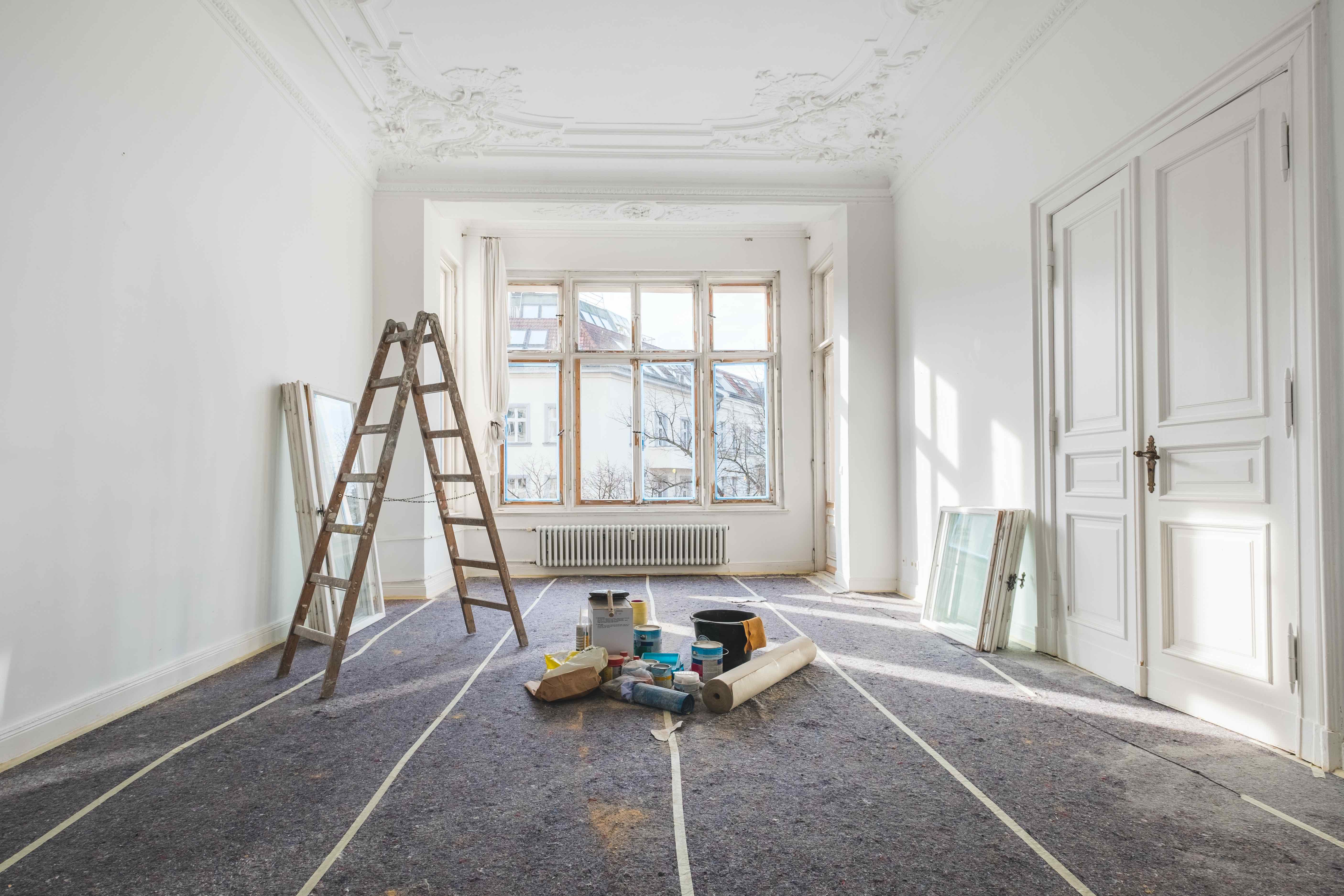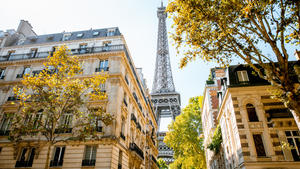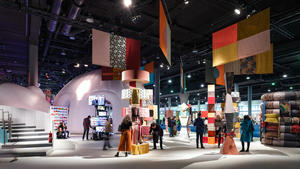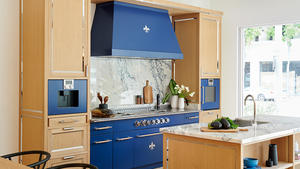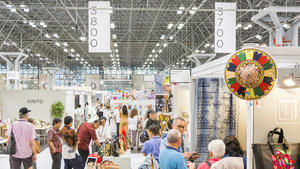These are strange times. As the coronavirus continues to spread across the globe, the impact is being felt at all levels of society and across all industries, including design. The primary concern is for public health, and for in-depth information about precautions to take, please visit the Centers for Disease Control and Prevention’s COVID-19 hub. However, at Business of Home we’re committed to following the effect of the pandemic and its economic fallout on the design trade. We’ll be collecting the most important stories here, in a—hopefully short-lived—regular feature. If your business is being affected or you have a tip, please drop us a line.
For a comprehensive list of industry cancellations and postponements, click here.
WHEN YOUR INSTALL FALLS DURING A PANDEMIC
While there’s many aspects of a designer’s job that can be done virtually in the midst of the COVID-19 outbreak, installations are still a hands-on process. They require teams of movers, painters, electricians and more to pull it all off—not to mention product, which could well be caught up in delays given the current climate.
For New York–based designer Michael Adams, it’s worth it to push pause for now: “As much as we want to install that beautiful chandelier in a client’s dining room, it’s not fair to put our clients, the movers, or even the people who operate the freight elevators in the buildings in a position where they have to be out and interacting with people and they don’t have a choice,” he tells BOH.
Even for designers trying to go about business as usual, the realities of the situation are hard to avoid. When New York designer Garrow Kedigian had a carpet installed in a client’s home this week, the installers arrived in medical-grade gloves and face masks. “The client, whose elderly mother lives with her, asked them to remain in the room where the carpet was being installed without any interaction with the rest of her family members,” says Kedigian. “At other installations this week, clients relegated their children to their bedrooms during the installations and asked delivery people to wash their hands and remove their shoes when they arrived.”
Delays in product are another bleak reality of the outbreak. Greenwich, Connecticut–based Charlotte Barnes says that she was informed earlier this week that a shipping container with items from overseas might simply be rejected at the border and sent back. “I’m assuming many of our vendors are going to be late with deliveries and that anything coming from abroad is going to get interrupted,” says Barnes. “Not to mention that any overseas projects are potentially compromised because of quarantines and the trickiness of traveling right now.”
For designers in areas that have been hit the hardest by the virus, logistical complications are arising within their own cities. Adams was set to do an install for a commercial project in midtown Manhattan this week—until the building’s management team stopped allowing deliveries and barred non-employees from entering the property. “We’re trying to move the project along in whatever ways we can,” says Adams.
The haywire economy is also leading to some stress among design clients. “With the stock market being so unsettling, one of my clients did want to take another look at the budget for their project,” says Los Angeles designer Linda Hayslett. “It’s tough because the market will eventually stabilize, and then, if we revisit the items [they decided to wait on] down the road, costs may be more for materials or installation because the project scope has become smaller at that point. If we start changing items now, during construction, it could delay the timing of completion and drag the project out to actually be longer.”
In addition to some natural anxiety for his own firm, Adams also worries about the economic repercussions of a slowdown in operations across the industry. “Designers support so many other businesses—whether it’s tradespeople or fabric companies—and if we don’t continue to place orders and give people our business, that loss is going to trickle down and be a huge issue for our industry. It sounds silly in some ways, but we do have to figure out how to keep pushing along.” —Haley Chouinard
SMALL BUSINESS RELIEF
In New York City, Mayor Bill de Blasio has announced that the city will be providing support to small businesses—that includes designers and interior architects at small firms—seeing a drop in sales revenue because of coronavirus. According to the city’s website, “Businesses with fewer than 100 employees who have seen sales decreases of 25 percent or more will be eligible for zero-interest loans of up to $75,000 to help mitigate losses in profit. The City is also offering small businesses with fewer than five employees a grant to cover 40 percent of payroll costs for two months to help retain employees.” For small New York–based design businesses, this comes as welcome news as the negative effects of supply chain disruption and social distancing begin to mount.
Other states are stepping up to help too: California is offering disability insurance to those who are infected and unable to work, according to the state’s website. Employers who are seeing a downturn in employee attendance as result of the coronavirus are encouraged to apply to the Unemployment Insurance (UI) Work Sharing Program, which allows employers to reduce working hours while offsetting the difference in wages through UI benefits.
In Washington, similar measures have been put into place to support the owners of local businesses. For businesses facing temporary shutdowns, employees are likely eligible for unemployment benefits; work share programs are also in place to alleviate some of the pressures businesses will face paying full employee wages. Seattle’s mayor, Jenny A. Durkan, announced new measures to provide immediate relief for small businesses impacted by COVID-19, including expanding the Small Business Stabilization Fund as well as technical assistance for small businesses once the Small Business Administration’s federal loan program becomes available. —Marina Felix
EUROPEAN TRAVEL BAN
President Trump’s ban on travel from 26 European countries goes into effect on Friday at midnight. The somewhat haphazard rollout—at first it seemed like all European countries would be affected, though it later became clear that American citizens and some countries were exempt—has led to no small amount of confusion among those in the design community who travel regularly to and from the continent. It’s a subject of particular concern to Odile Hainaut and Claire Pijoulat, the organizers of WantedDesign, a festival celebrating international design, which is still slated to go ahead on May 17 in tandem with ICFF at the Javits Center in New York.
“Every hour, there’s something new developing,” Hainaut tells BOH. “The travel restrictions mean that no one can really plan. It’s obviously a big problem for the participants, manufacturers, and shipping, as well as the schools that we’re partnering with—half of them are from abroad.”
For now, the ban is scheduled to last 30 days—ending well before Wanted’s debut. But confusion around the restrictions and uncertainty around the continued spread of COVID-19 has led to a flurry of conversations about what comes next. “Honestly, we have a lot of people hoping that it’s happening and a sense of hoping for the best,” says Pijoulat. “People are of course eager to understand what’s going to happen. There’s confusion in our community, but no panic.” —Fred Nicolaus
LATEST NEWS
The global response to COVID-19 is rapidly evolving, with new information coming in a seemingly constant flow. Below, we’ve gathered the latest updates that pertain to the design industry.
- President Trump has officially declared a national state of emergency this afternoon in order to divert disaster relief funds to combating the outbreak. He invoked the Stafford Act, a move that will give FEMA the power to coordinate aid and response to the crisis.
- The French government announced today that gatherings of 100 people or more are prohibited. Similar measures are being enforced throughout the United States, with North Carolina also adopting the 100-person limit. California and Washington have both banned gatherings of 250 or more, while New York is still allowing gatherings of up to 500.
- Joining other cultural institutions across the globe, New York’s major art galleries—including Pace Gallery, Hauser & Wirth, Gagosian and David Zwirner—have all announced closures amidst the pandemic. In Los Angeles, the Getty Center and Getty Villa have announced that the museums will close starting March 14.
- President Trump’s ban on travel from 26 European countries goes into effect today at 11:59 p.m. The restrictions do not apply to American citizens and exclude Britain, Croatia, Cyprus, Ireland, Turkey and Ukraine. For a more comprehensive look at the restrictions, head here.
CALENDAR UPDATES
The mass cancellation of industry events continues unabated. Here is today’s crop:
- Texas Design Week, which was scheduled for March 23 to 30, has been postponed until May; new dates have not yet been announced. The PaperCity Design Awards will continue to accept entries until April 20.
- The International Window Coverings Expo in Charlotte, North Carolina, has been postponed. The show was supposed to run from March 25 to 27 at the Charlotte Convention Center; new dates have not yet been announced.
- Apartment Therapy’s Small/Cool contest has been postponed. Originally scheduled for April 4 and 5, the interactive design experience focused on small-space living will now take place June 12 to 14.
For a comprehensive list of industry cancellations and postponements, click here.
















